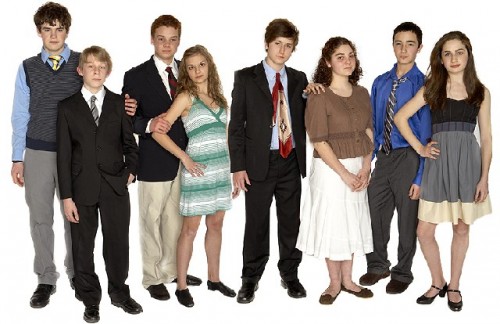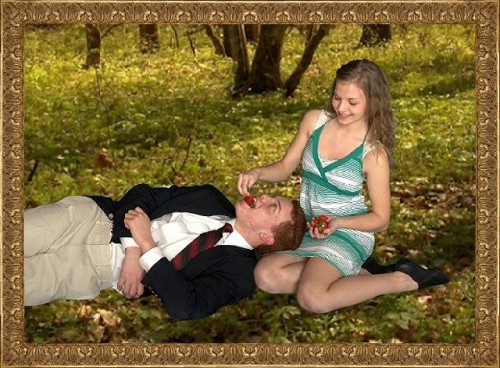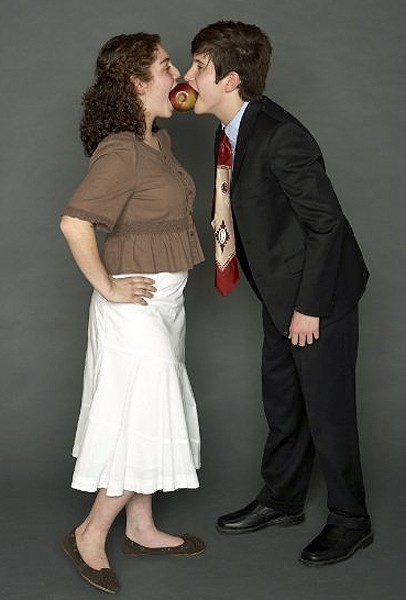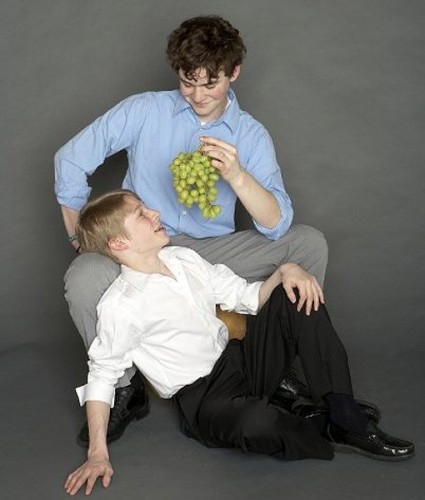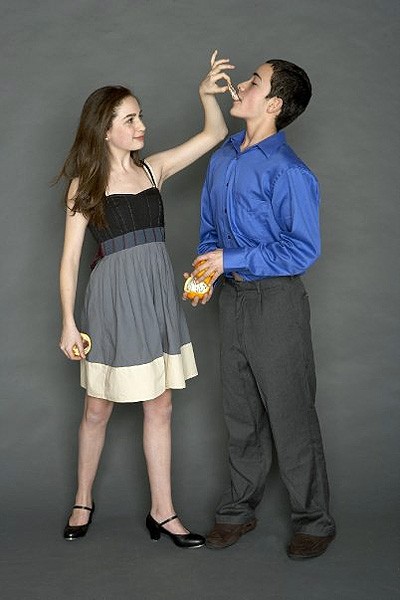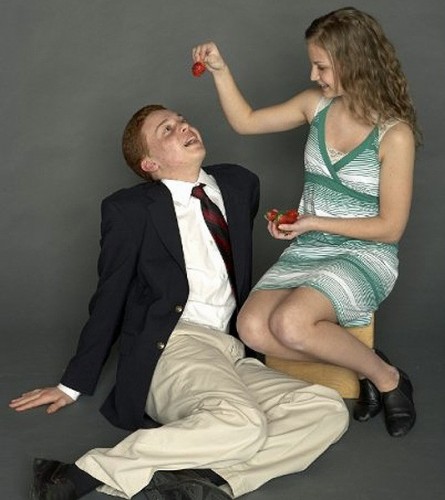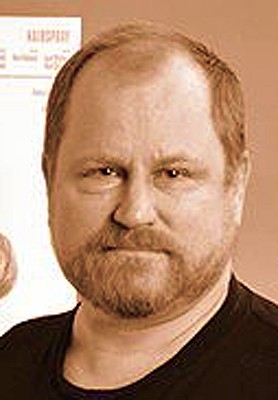Two Spring Awakenings in Boston This Month
Zeitgeist Offers the Uncut, Uncensored Original Play
By: Larry Murray - Apr 04, 2009
Spring Awakening, the play, aroused the censor's outrage from the day it was written. It took eighty years for the first uncensored version to be performed, and more than a century for it to reach a Boston stage intact. There's no guarantee there also won't be an uproar this time around. Boston still has its Puritan roots even if the city censor is no longer a patronage position.
We spoke to David J. Miller, the artistic director of Zeitgeist Stage Company and a veteran of more than two dozen productions. He is preparing Spring Awakening for a three week run, from April 17-May 9 at the Boston Center for the Arts. Zeitgeist is a three time winner of the prestigious Elliot Norton Award for Outstanding Fringe Theatre Production, and was named Boston's Best Fringe Theatre by the Improper Bostonian. How appropriate. The musical version, currently on national tour, arrives at the Colonial Theatre on April 28.
Larry Murray: How did this project start?
David J. Miller: My partner, Reinhold Mahler, and I were both introduced to the material when we attended a preview performance of Spring Awakening, the Broadway musical in November 2006. At intermission, I expressed interest in doing the show even though Zeitgeist hadn't previously done any musicals. However, at the end of the show as we were walking up the aisle, I predicted Zeitgeist would never get near the property because I felt it would win a Tony Award, spurn a national Tour, and be in demand by theater companies with more clout than our company. Reinhold responded, "Do the play instead, we can do a new translation." So this production was born that November night under the marquee of the Eugene O'Neil Theater where Spring Awakening: The Musical was about to embark on its award winning run.
LM: What's different about your vision of the play?
DJM: In the musical, the teens are played by actors in their twenties. From the outset, my goal was to do Spring Awakening with age appropriate actors portraying the timeless, conflicted teens that Wedekind created. That cast is now assembled and I am thankful to the talented and courageous actors of all ages - as well as their families - for their help in making this Spring Awakening an authentic one.
LM: You've just begun rehearsals, how are they going?
DJM: Really well. Some of the actors are already off book for certain scenes, even though some of them are still finishing their commitments to other shows around the area. Some of the actors are still calling for lines, but the rehearsal process is progressing nicely. These young actors are truly amazing.
LM: I imagine it is a challenge working with younger actors.
DJM: It is, although all of my younger actors have Huntington, New Rep, Lyric and Wheelock theatre experience, so they are steeped in a professional environment. Not only are they good actors, some have more credits than I do!
LM: Is your partner and translator Reinhold Mahler making changes to the script as the process goes forward?
DJM: No, but I am. (laughs) He did the direct translation and then I adapted it. German sentences are constructed very differently from English ones. So if an actor is having a problem with a particular line, or something is not flowing the way it should, then I may make a change. But for the most part, 95% of it is pretty much set.
LM: Do you think the play is stronger than the musical from the audience's viewpoint?
DJM: The audience reaction remains to be seen of course. I see the play as far more forthright about sex than the musical. The topics include the usual teenage angst, but also include masturbation, rape, S&M, homosexuality, abortion, child abuse and even a circle-jerk. By its very nature, even a 110 years later, a musical has to tone some things down, but the play remains unblinking.
In the musical, for example, the Melchior-Wendla scene is a seduction, while in the play it is far more complicated and intense. The play was a century ahead of its time, some of its issues are still controversial. The first English language production in the United States in 1917 almost didn't take place because the New York City Commissioner of Licenses attempted to prevent it, claiming that the play was pornographic. Almost immediately, Wedekind secured a court injunction allowing the play to go on. Unfortunately, the audience and critics seemed to agree with the Commissioner, and the play closed after a single performance.
LM: Theatre has always been a risky business. But having both versions up at the same time will give us a choice, and the ability to make a comparison.
DJM: Yes, and in the end it will be seen either as a brilliant choice of programming or an idiotic choice. That is a decision the public will make.
LM: Do you think that you will share audiences with either the musical or with the fans of Dame Edna who will also be playing around the same time? Will that crowd find their way down Tremont Street to the South End?
DJM: We'd welcome some of those Gladiola lovers to the Boston Center for the Arts, but I do think our audiences are different. There's a difference in taste between theatre-goers who support the smaller theatres in town, and the mainstream shows. There is overlap, too - many people just love theater in all its forms. I see our audiences as enjoying progressive, involving forms of theatre, that's more than just entertainment.
LM: I think many earlier Zeitgeist productions have given us both in one sitting.
DJM: Thank you.
LM: Would you place Wedekind among those who pioneered realism in the theatre. I'm thinking of G.B. Shaw in England, Chekhov in Russia, and Ibsen in Sweden? Sometimes I see Wedekind described as an expressionist writer.
DJM: Spring Awakening is a very naturalistic play for 17-18 scenes and then it has Moritz appearing from beyond the grave to argue with the mysterious Masked Man about life vs. death. So it can be described as realism with an expressionist ending. I like to call it the most censored play in history - it took 75 years for it to be performed without severe cuts - and if it had been performed in its entirety when it was written it would have had as much impact as Ibsen's Ghosts did.
LM: Why do you think that?
DJM: The famous "dirty play" of the 1890s was Ibsen's Ghosts, where the consequences of congenital syphilis haunt the play's Victorian family. Ghosts was able to reach theater audiences and shock it, while Spring Awakening was not even allowed to reach theaters lest Western civilization crumble and collapse. (Ghosts with Randy Harrison will be performed this season by the Berkshire Theatre Festival).
LM: Ah, the other forbidden subject of venereal disease and "the sins of the father visited upon the son."
DJM: Spring Awakening wasn't able to have its true impact since it was cut and truncated all the time. And now, 110 years later, it is having a renaissance because of a musical adaptation.
LM: How often do you think Spring Awakening, the non-musical, is being performed these days?
DJM: More than you would expect because the work is now in the public domain. There are at least ten English versions floating around. Margarett Perry did a wonderful version at Holy Cross in 2005 which was set in modern America. Over a century has passed, and we struggle with the same issues. Since the copyright expired it is quite frequently done at the college level, it's perfect for that age range and interests. But it is not done that often professionally, even with the low royalty payments.
LM: What time frame are you using?
DJM: We're keeping it in 1890s Germany. We want to reflect the flavor of those times. The German is written in, at times, a very flowery tone which is typical for that period. Yet we are sensitive to the need for the actors to have words that are natural to speak, and for audiences to understand.
In the play, there are more adult characters than teens, and, for example, when they confront Melchior, they speak these highly long and complex - and satirical - lines. As in German, some of these sentences are more like paragraphs. In doing the translations it was a complex job to separate the prepositions from the verbs while maintaining what is really trying to be said. We worked to make it understandable to the actors and audience, to maintain the satire, and yet to keep it moving and flowing naturally.
In some ways, the long sentences of the adults are like singing. You have to plan ahead where you take in a breath. This is even after we did what we could to pare them down. The sentences are still long for English, but not nearly as long as they were in German.
LM: How many total in the cast?
DJM: Eighteen, eight are teens and ten are adults.
LM: And 90 seats in the theatre? Oh my.
DJM. We've done bigger, like the Kentucky Cycle in that space. So it's not a record for us, but it is a big show with a big cast. And I have double, tripled and quadrupled the roles for many in the cast. This was written in the 1890s when actors were cheap. There are some 45 different roles in the play. There is a doctor who comes on for three lines and a locksmith for three lines, so multiple roles are not that difficult to pull off for the adults.
LM: Did you have any angels to help with the expense?
DJM: No.
LM: So you're the angel?
DJM: I have very creative designers who can work miracles on small budgets. And I am also doing the set design. We can do a lot with very little. Carolyn Clay (the Boston Phoenix Critic) once said that we do blockbusters on a budget, or something like that. With our imagination, plus that of the audiences, we can accomplish a lot.
LM: Finally, what does this play have to do with life in the twenty-first century?
DJM: Perhaps Emma Goldman said it best: "Never was a more powerful indictment hurled against society, which out of sheer hypocrisy and cowardice persists that boys and girls must grow up in ignorance of their sex functions." The play is often considered one of the classics of contemporary theater, with Wedekind taking on a progressive subject matter and tackling it in a manner that was a century ahead of its time.
Sadly, the repression of the truth about matters sexual continues even to this day. Even as new succeeding generations have to come to grips with their own spring awakenings, the effort to deny them factual information and forums continues.
LM: Ah yes, We see the fear of sex every day from the evangelicals, timid school boards and administrators, and politicians exploiting public fears on the subject.
DJM: The conflict is timeless, and this play shows the consequences of repressing kids. But there is also a comic edge to this tragedy. It is funny watching kids trying to figure this information out on their own. In Spring Awakening, the audience connects to the kids, because their story is our story. The struggle of teens is relevant even today. When Wendla is denied the truth about how babies are born, she ends up getting pregnant and announces to her mother that she can't believe in the stork anymore.
Performance Details: Spring Awakening: The Play will be presented in the Plaza Black Box Theatre at the Boston Center for the Arts from April 17 through May 9, 2009 with performances Thursdays & Fridays at 8 PM, Saturdays at 3 & 8 PM, and Sundays at 3 PM.
The teenage roles will be played by New England teenagers, including Paul McCallion as Melchior, Rebecca Stevens as Wendla, Carlos Rojas as Moritz, as well as Amelia Estrada, Gabe Goodman, Cameron VanderWerf, and Talia Weingarten. The adult roles will be played by Jake Berger, Douglas Cochrane, Michael Steven Costello, Michelle Dowd, Ruby Fox, Sara Jones, Maria Mogavero, Bill Salem, and Chuck Schwager. The production will feature costumes by Krystal Bly, sound by Walter Eduardo, lights by Chris Fournier, and sets by Miller.
For more information on Spring Awakening, call 617-933-8600 or visit www.zeitgeiststage.com.
Quick Link to Zeitgeist Stage Company

